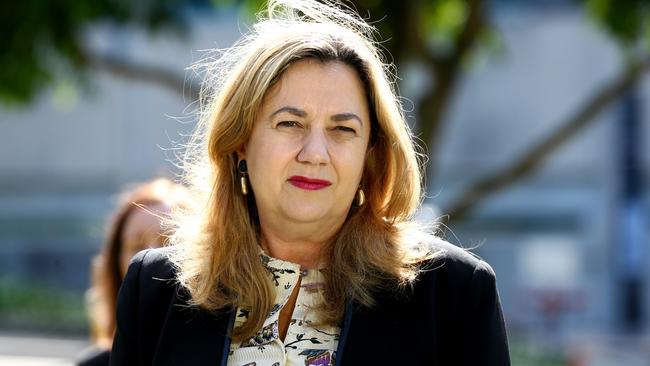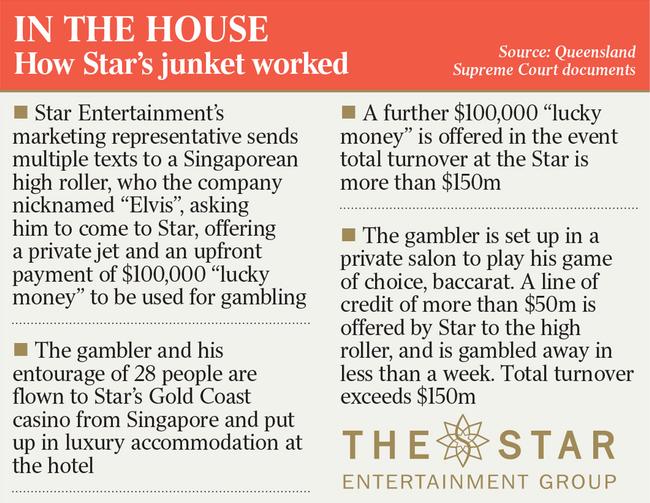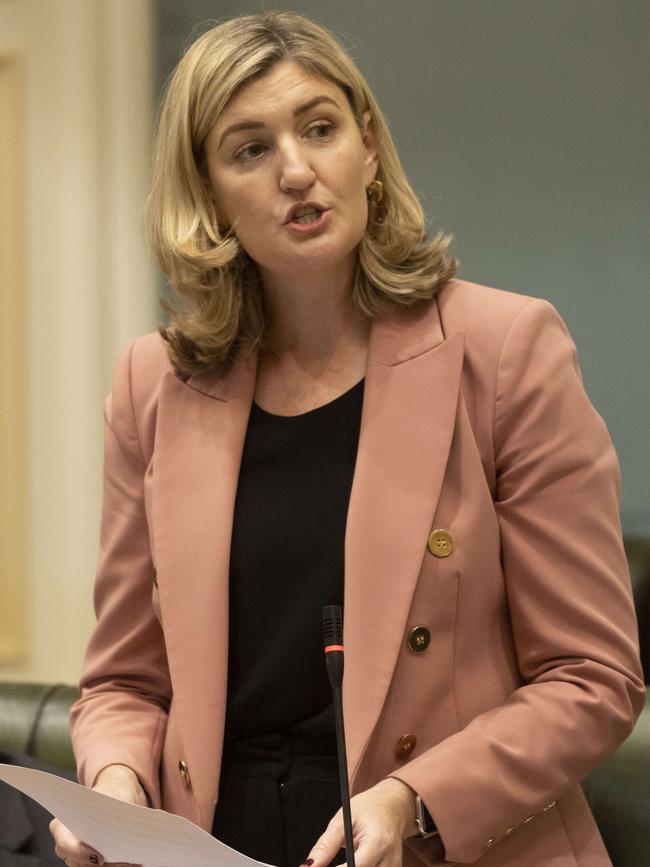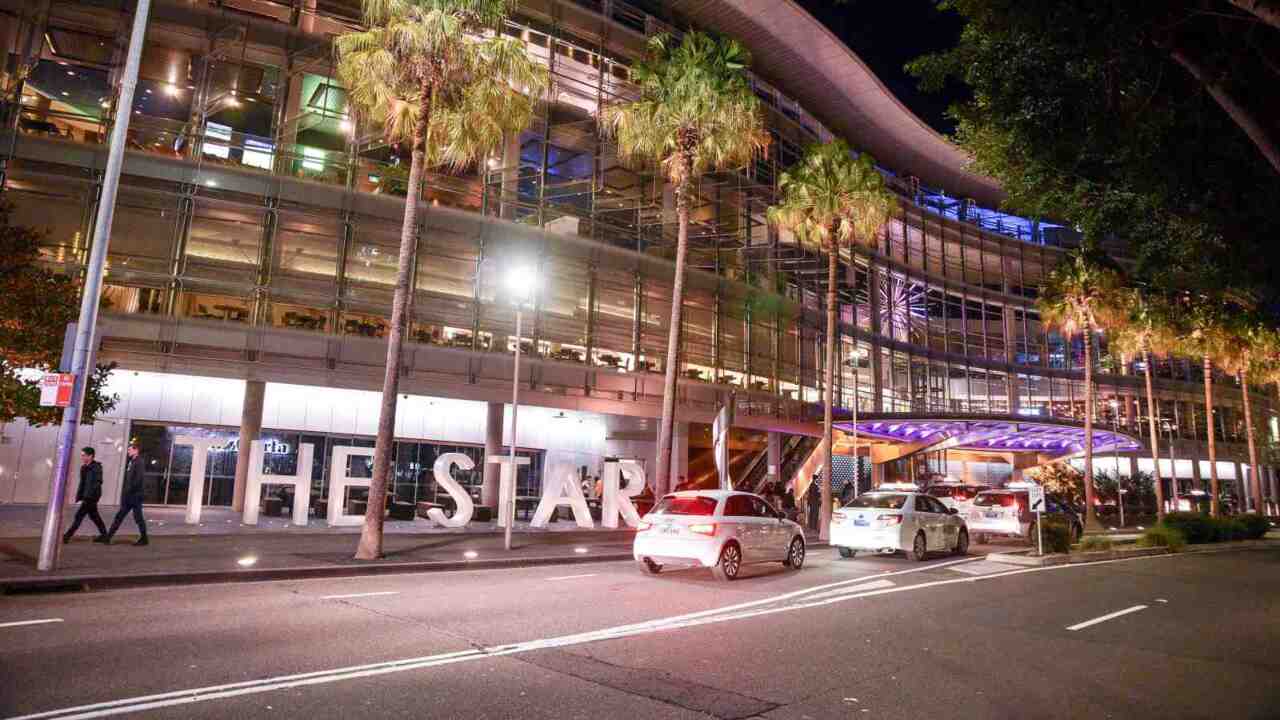Star Entertainment strife sparks new inquiry, licence under scrutiny
An independent inquiry will investigate Star Entertainment’s fitness to keep casino licences in Brisbane and the Gold Coast.

An independent inquiry will investigate Star Entertainment’s fitness to continue holding casino licences in Brisbane and the Gold Coast, after revelations of money laundering, fraud and illegal junkets at the gaming giant’s Sydney operations.
After months of resisting calls for an inquiry, Premier Annastacia Palaszczuk on Monday committed to appointing an external investigator to probe Star’s two casinos as it builds its new flagship, the $3.6bn Queen’s Wharf casino in Brisbane.
The office of Attorney-General Shannon Fentiman said the inquiry would go ahead and cabinet would soon consider who would head it and the terms of reference.
The move follows months of evidence of criminal behaviour aired at the NSW inquiry into Star’s Sydney casino, which has prompted an exodus of the company’s executives and a recommendation it be stripped of its licence. Similar probes were also held into Crown casinos in Victoria, NSW and Western Australia.
Ms Palaszczuk relented to calls for a Queensland inquiry after The Australian on Monday revealed the close ties of senior Labor figures and Star including that the lobbyist who ran her 2020 re-election campaign was secretly advising the company in dealing with the government.
It can also be revealed that the viability of Star’s Queen’s Wharf casino, due to open next year, is dependent on “junkets” that bring rich Chinese gamblers and are now at the centre of money laundering and tax evasion allegations.
A former senior Star employee with knowledge of its “business case” for Queen’s Wharf, has told The Australian the success of the riverfront casino was predicated on taking 10 per cent of the junket market coming to Australia.

The source said junkets at Brisbane’s Treasury casino and The Star on the Gold Coast were run identically to those that operated in Sydney, with gambling “cages” for high rollers and the revenues put through the hotel arm of the operations.
“The junkets would come in, set up in a room and put up their signage and we’d supply the dealers and supervisors,” the source said. “It was a joint venture arrangement between junkets like Suncity and Star.’’
The independent inquiry in NSW, headed by Adam Bell SC, has in recent months heard that Star concealed nearly $1bn in suspicious gambling transactions from law-enforcement agencies and other institutions by marking the money as hotel expenses.
Senior Star executives conceded that the company had also misled the National Australia Bank about the nature of cash withdrawals, which flouted anti-money-laundering procedures.
The transactions used China Union Pay, which is issued to international high-rollers for use on hotel services including accommodation but is not to be used for gambling.

The source said that without the junkets – which have been suspended by Star during the NSW inquiry public hearings – Queen’s Wharf would struggle. “The viability of the project was dependent on the junkets, that is what the senior executives needed for the business case,’’ the source said.
Despite the revelations in NSW, the Palaszczuk government had refused to call an inquiry into Star and instead last month introduced pre-emptive legislation to tighten regulations on casinos, including fines of up to $50m for integrity breaches, in a move it hoped would be enough to silence calls for an inquiry.
Soon after first winning power in 2015, Ms Palaszczuk awarded the rights to Star to develop the Queen’s Wharf casino-residential development over a rival consortia, led by Crown.
It is understood union leader Gary Bullock – head of Labor’s dominant Left faction, who struck a workplace deal with Star – and the gaming company’s then in-house lobbyist, Alison Smith, the wife of former deputy premier Paul Lucas, were influential in convincing Ms Palaszczuk to award the project to Star.
Since then the government has remained close to executives at Star, which has hosted and paid for fundraisers for government ministers.
After the revelations about Star’s use of Mr Moorhead, her closest political adviser, as a paid consultant and her failure to follow other states with an inquiry, Ms Palaszczuk said cabinet was “carefully considering all of these matters”.
“The Attorney-General will have more to say about this but she’s taking these issues very seriously, and we’ve actually committed to an independent assessment, but I think I’ll wait for the Attorney-General to make further comments,” Ms Palaszczuk said. “What has been raised in NSW is serious. Our cabinet takes it seriously.”

A spokeswoman for Ms Fentiman said: “More will be announced at the appropriate time.”
Any inquiry, and subsequent move to strip Star of its licence, would call into question the ownership and management of Queen’s Wharf, the state’s biggest private project.
Opposition Treasury spokesman David Janetzki said a full, transparent inquiry was needed. “Queenslanders need to be certain that Queen’s Wharf is built on the strongest foundations of integrity,’’ he said. “Labor are more interested in secret deals with Labor mates and Labor lobbyists than protecting the integrity of our state’s international tourism industry”.
While the NSW inquiry into Star has focused on allegations in that state, evidence has been uncovered that wrongdoing extended to the company’s Queensland operations.
In Queensland, junkets are ostensibly strictly regulated, with casino operators required to provide a signed copy of each junket agreement to the Office of Liquor and Gaming Regulation, and a copy of certain parts of the passport information of each international participant. But an independent audit by KPMG in 2018 found Queensland’s oversight of the risks of Star’s overseas junkets was flawed.
“There is no documented (money laundering/terrorism financing) risk assessment or risk assessment methodology in relation to junkets,” the KPMG audit found.
“Due diligence on junket participants is limited, particularly in Queensland. No inquiries are made on the junket participants’ source of wealth or funds.”
Queensland Supreme Court documents give an insight into Star’s approach to junkets in Queensland, with the company luring highrolling international gamblers to their Gold Coast casino by promising private jets, free accommodation, and gifts of hundreds of thousands of dollars in “lucky money” if they spent staggering amounts of cash. The documents detail one case – which occurred in 2018 and was governed by a “special junket agreement” under Queensland law – targeting Singapore-based high roller Yew Choy Wong.
Star did not returns calls.





To join the conversation, please log in. Don't have an account? Register
Join the conversation, you are commenting as Logout